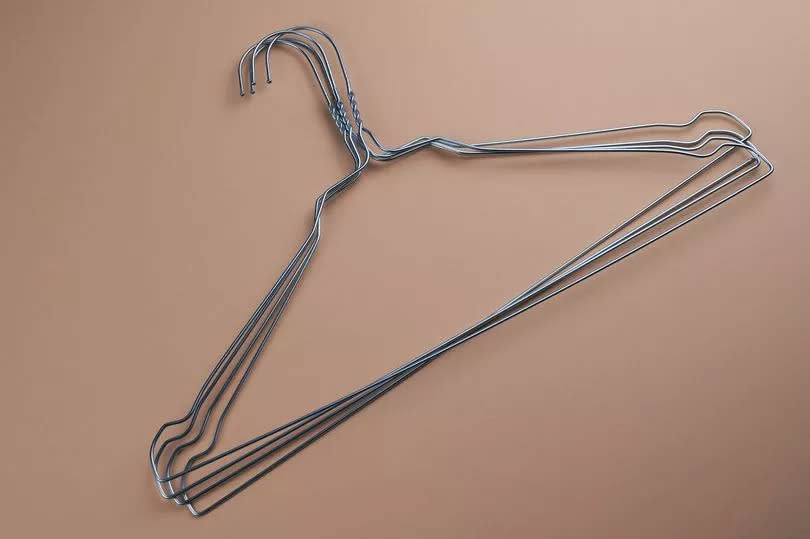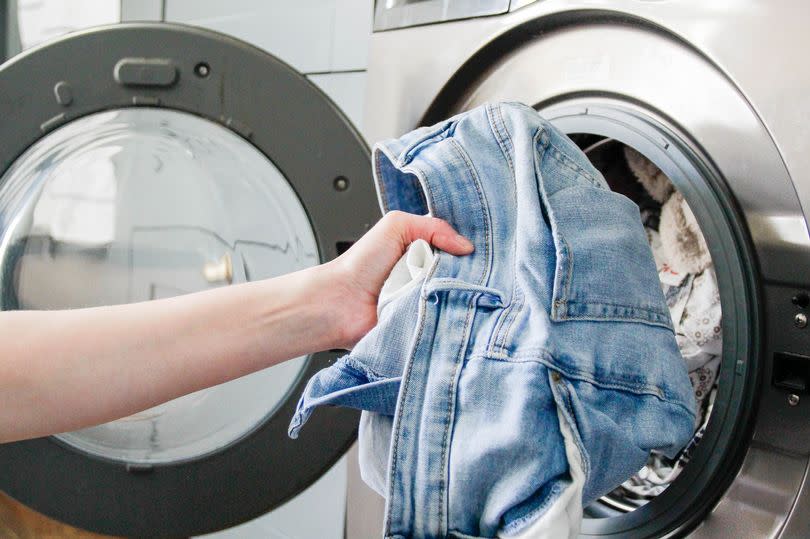Fashion expert warns against hangers and says 'you've been storing clothes wrong'

Clothing experts from top fashion brand Superdry have revealed their insider knowledge on how to make your clothes last longer and maintain quality. They've also shared a few industry secrets, including a surprising item that could be damaging your clothes.
Superdry advises against using wire hangers. They say using them can significantly damage the quality of your clothes, including causing them to stretch and fall out of shape.
The experts recommend storing your clothes correctly to preserve their shape and condition. For instance, knitwear should be folded and stored on a shelf rather than hung up to prevent stretching.
Deborah Painting, head of quality and technical at Superdry, says: "Another key thing to remember when storing your clothes is to make sure you use hangers that are designed to properly support the weight and shape of each garment. Using a cheap wire hanger for your expensive blazer is going to ruin its shape.
"Instead, you should consider investing in a proper jacket hanger that will keep the correct shape. And always make use of the hanging loops that you find inside your clothes they've been added for a reason: to help keep garments in the right position when they're on the hanger, supporting the weight and stopping fabrics from stretching and distorting."

Deborah has also shared seven other top tips to extend the life of your clothes:
1. Wash smart, not often:
Washing your clothes too often can cause them to stretch and wear out faster. Try rotating your outfits to give your clothes a break between washes. By following this easy suggestion, you can extend the life of your clothes and find joy in rediscovering pieces hidden in your closet, which helps curb the urge to buy unnecessary items.
Deborah explains: "For delicate items, some professionals in the costume industry go as far as recommending a gentle spritz of vodka to eliminate odour and help preserve the fabric's integrity by avoiding unnecessary washing. This secret method freshens the garment without risking damage and is perfect for dry clean only items that cannot be washed in a machine.
"Not all fabrics react in the same way, so take care when applying any treatment. Alcohol may cause a colour change so always test on a small area of the garment first. And don’t hold the spray bottle too close – you’re aiming for a gentle mist across the fabric surface."
2. Let nature do its work:
Utilise the natural power of the outdoors by opting for a clothesline or drying rack instead of a dryer. This will help prolong the life of your clothes by reducing the damage caused by heat.
Sunlight has natural antimicrobial properties and can also help whiten fabrics gently. For an extra whitening boost, try lightly spraying your clothes with white vinegar before hanging them outside to dry in the sun. This will help keep your whites looking bright and fresh.
Certain textiles may stiffen when dried using this method, particularly those crafted from natural materials such as cotton. To prevent this, consider partially drying outdoors and completing the process with a brief tumble in the dryer.
Carefully smooth out clothes to eliminate wrinkles before hanging them up or laying them on a drying rack - this will cut down on the need for ironing. Also, be cautious when using clothespins to avoid leaving indentations on delicate fabrics.
3. Make the most of cooler washes:

Deborah says: "Embrace the benefits of cooler wash cycles, which conserve energy, preserve the vibrant colours of your clothing, and reduce the chances of shrinkage. This tip is a great way to save even more money and massively reduces the chances of accidentally ruining your favourite outfit.
"Be sure to consult the washing instructions on the label for specific temperature recommendations for your clothes, as many delicate items will need to be hand-washed only. Many washing machines now have ‘Hand Wash’ programmes which not only wash at a lower temperature but also agitate the garments less, with a gentler spin cycle for reduced creasing."
She added: "If you opt for traditional handwashing, always use a specialist detergent which will be kinder to your clothes and your hands. Rinse thoroughly to rinse residual detergent away, and squeeze firmly to remove excess water – but never wring or twist as that can cause damage to the fabric or distort a garment’s shape."
4. That's the spot:
Focus on spot cleaning to tackle stains and spills first, which can help decrease the need for frequent washings and prolong the life of your clothes. Washing too often can lead to shrinking, colour loss, and early wear and tear on your beloved garments.
If you notice a minor mark or stain on your clothing, give spot cleaning a try before jumping to wash it right away. Using the right product for both the type of fabric and the type of stain will help you get the best results.
Make sure to always adhere to the instructions and try testing a small, inconspicuous area of the clothing first to ensure there are no unexpected colour changes or damage.
5. Bag it up:
Protect your delicate items like lingerie and knitwear by using mesh laundry bags when washing them. This will help prevent stretching and snagging during the wash cycle, giving them an extra layer of protection.
Deborah added: "Many clothes will benefit from being washed inside out. This offers further defence against friction and abrasion, prolongs garment lifespan, and minimises damage."
6. Be extra careful when ironing:
Remember to be cautious when ironing your clothes to avoid damaging your favourite piece. Choose the right temperature setting and utilise a clean, damp pressing cloth for delicate fabrics to protect them from heat and maintain their quality.
"Proper ironing techniques make your clothes look their best and contribute to their longevity, reducing the need for frequent replacements. Professionals always iron items made from natural fibres like cotton and silk while they are still damp as it helps deal with creasing," Deborah explained.
"And invest in a detachable Teflon sole-plate to use on synthetic or delicate fabrics – this diffuses the heat and prevents scorching or burning."
7. Revive and thrive:
Deborah said: "Embrace a mindset of repair over replacement. Acquire basic sewing skills or enlist the assistance of a tailor to mend damaged garments and extend their usability.
"From reattaching buttons to darning holes, simple repairs can significantly reduce waste and promote a more sustainable approach to fashion consumption. Additionally, investing in higher-quality clothing often means easier repairs and longer-lasting wear, further minimising your environmental impact and saving you money in the long run."
Deborah Painting added: "The emphasis on sustainability in the fashion industry has grown significantly in recent years, reflecting a broader concern for personal environmental impact. These simple tips highlight a few easy ways to keep your favourite clothing items in good condition for longer, minimising the need for replacements.
"By incorporating simple strategies such as air drying, spot cleaning, and garment repair, individuals can actively contribute to mitigating fashion's environmental impact. What's more, caring for your clothes and extending their wear time helps to both save you money and keep your favourite items of clothing looking good for longer."

 Yahoo News
Yahoo News 
